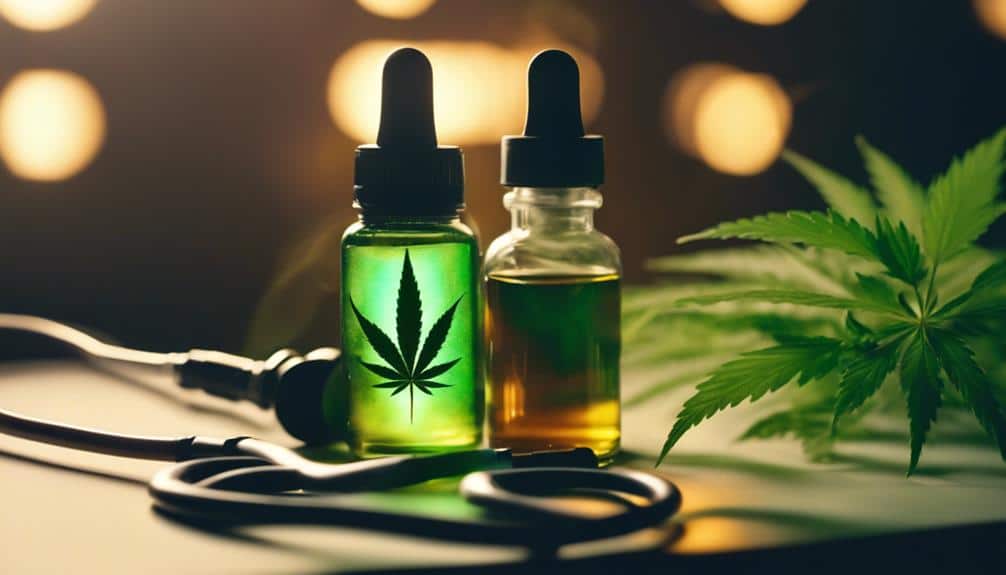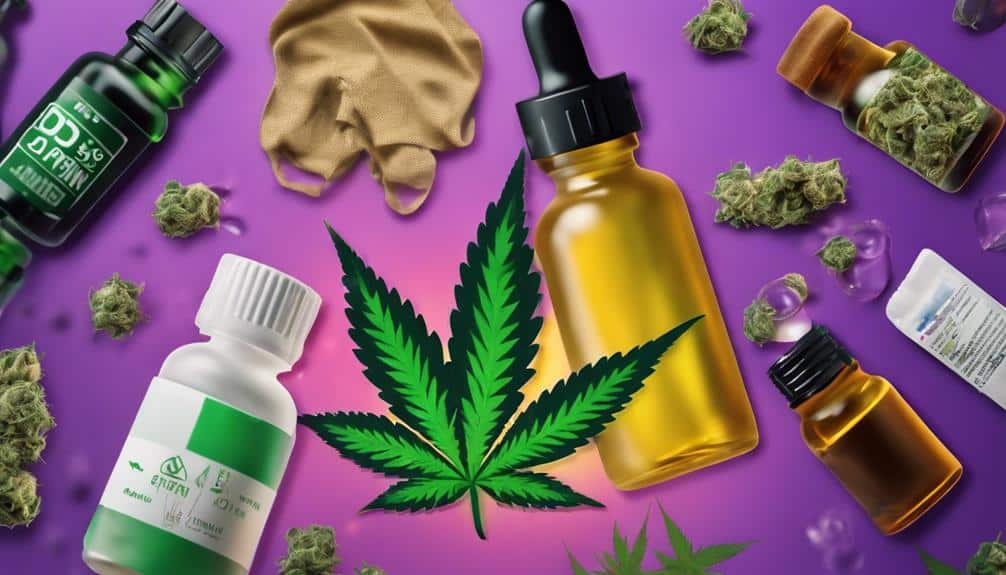Just like Pandora’s box, opening the discussion on CBD and THC in medical marijuana reveals both challenges and opportunities. You’ve probably heard about these compounds, but understanding their distinct benefits could be a game-changer for managing health conditions. CBD, known for its anti-inflammatory properties, offers relief from anxiety and chronic pain. THC, on the other hand, is praised for stimulating appetite and reducing intraocular pressure. Curious about how these cannabinoids can improve quality of life for patients? Let’s explore this further together.
Understanding Cannabinoids

Cannabinoids are the active compounds in medical marijuana that interact with your body’s endocannabinoid system to produce therapeutic effects. The endocannabinoid system plays an essential role in maintaining homeostasis by regulating various physiological processes like pain perception, mood regulation, and immune function. When cannabinoids such as THC and CBD enter your body, they bind to specific cannabinoid receptors—primarily CB1 and CB2 receptors—found throughout your central and peripheral nervous systems.
CB1 receptors are mainly located in the brain and nervous system where they influence functions like cognition, coordination, and pain perception. On the other hand, CB2 receptors are primarily found in the immune system and peripheral organs where they modulate inflammation and immune responses.
By activating these receptors, cannabinoids help regulate your body’s internal environment leading to potential therapeutic outcomes.
Understanding how cannabinoids interact with the endocannabinoid system is fundamental for effectively utilizing medical marijuana to alleviate symptoms and improve patient well-being. Research continues to uncover the complex mechanisms through which cannabinoids and cannabinoid receptors contribute to therapeutic effects.
Health Benefits of CBD
CBD has demonstrated numerous health benefits, providing relief from anxiety, chronic pain, and epilepsy. Research indicates that CBD interacts with the endocannabinoid system, which plays an important role in regulating mood, pain perception, and neurological function.
For individuals with anxiety, studies have shown that CBD can greatly reduce symptoms by modulating serotonin receptors thereby promoting a sense of calm without the psychoactive effects associated with THC.
In the domain of pain management, CBD’s anti-inflammatory properties make it a viable option for those suffering from chronic pain conditions such as arthritis or fibromyalgia. By inhibiting the transmission of pain signals through the nervous system, CBD offers a non-addictive natural alternative to opioid-based medications. Clinical trials have demonstrated that regular use of CBD can lead to notable reductions in pain and improve overall quality of life.
Moreover, CBD has shown promise in treating epilepsy particularly in cases resistant to conventional treatments. The FDA has approved Epidiolex—a CBD-based medication—for specific types of epilepsy underscoring its therapeutic potential.
Therefore incorporating CBD into medical protocols not only enhances patient care but also aligns with a holistic approach to health and well-being.
Health Benefits of THC

THC, the primary psychoactive compound in marijuana, has been shown to offer significant therapeutic benefits for various medical conditions. One of the most well-documented benefits of THC is its ability to stimulate appetite which can be particularly beneficial for patients undergoing treatments like chemotherapy or dealing with conditions such as HIV/AIDS. These patients often struggle with severe appetite loss leading to malnutrition and further health complications. By promoting hunger, THC helps ensure that these patients maintain adequate nutritional intake which is essential for their overall well-being and recovery.
Another key therapeutic use of THC is in the management of glaucoma. Glaucoma is a condition characterized by increased intraocular pressure which can lead to optic nerve damage and ultimately vision loss. Research indicates that THC can reduce this intraocular pressure providing much-needed relief and potentially slowing the progression of the disease.
While it’s not a cure, the ability of THC to alleviate symptoms makes it a valuable option in comprehensive management of glaucoma.
CBD Vs Thc: Key Differences
When comparing the effects of cannabis compounds you’ll find that CBD and THC have distinct differences in their psychoactive properties and therapeutic applications.
CBD or cannabidiol is non-psychoactive meaning it won’t give you a ‘high.’ In contrast, THC or tetrahydrocannabinol is the primary psychoactive compound in cannabis responsible for euphoric sensations.
The legal status of these compounds also varies. CBD when derived from hemp is legal in most places due to its low THC content. However, THC remains a controlled substance in many regions though it’s legal for medical use in some areas. Synthetic cannabinoids designed to mimic THC often fall into legal gray zones and can sometimes pose higher risks due to their unregulated nature.
Therapeutically, CBD is often praised for its anti-inflammatory and anxiolytic properties without altering mental state. THC has its own set of medical benefits including pain relief and appetite stimulation but it also carries the risk of psychoactive side effects.
Understanding these key differences can help you make informed decisions about medical marijuana and its potential to serve those in need.
Medical Conditions Treated

Medical marijuana is increasingly being recognized for its potential to treat a variety of medical conditions from chronic pain to epilepsy. By understanding how cannabinoids like CBD and THC interact with the body’s endocannabinoid system you can better appreciate their therapeutic benefits.
Studies have shown that medical marijuana can provide effective relief for several conditions:
- Chronic Pain: Many patients report significant reductions in pain making it a viable alternative to opioids.
- Epilepsy Treatment: CBD, in particular, has shown promise in reducing seizure frequency and severity in patients with epilepsy.
- Multiple Sclerosis: THC and CBD can alleviate muscle spasticity and improve mobility.
- Anxiety Disorders: Both CBD and THC are noted for their potential to reduce anxiety symptoms.
- Cancer-Related Symptoms:Cannabis can help manage nausea, vomiting, and pain associated with cancer treatments.
The evidence supporting these benefits is growing but it’s important to approach each case individually. Not everyone will respond the same way, and you should consider the specific medical condition, the patient’s overall health, and the appropriate cannabinoid ratio.
Future Research Directions
As the therapeutic applications of CBD and THC become more apparent researchers are increasingly focusing on future studies to better understand and optimize these benefits. Future research directions include conducting rigorous clinical trials to gather robust evidence on the efficacy and safety of these compounds. These trials are essential for validating therapeutic claims and for determining appropriate dosages for various medical conditions.
However one of the major hurdles you may encounter is regulatory challenges associated with conducting such studies. The legal status of marijuana varies markedly across different jurisdictions which can complicate the approval process for clinical trials. Navigating these regulatory landscapes necessitates collaboration between researchers healthcare providers and policymakers to ensure that studies can be conducted ethically and efficiently.
Additionally there’s a need for long-term studies to assess prolonged effects of CBD and THC use. Understanding potential interactions with other medications and their impact on different population groups such as elderly or those with chronic illnesses is crucial.
Conclusion
By delving into the world of CBD and THC you’re opening a modern-day Pandora’s box of potential health benefits. This exploration reveals how these cannabinoids can alleviate anxiety pain, among other symptoms making them invaluable for various treatments.
The evidence points towards a promising future where medical marijuana could greatly improve quality of life. As research advances we’ll witness even more groundbreaking discoveries reminiscent of accessing hidden treasures.
If you’re curious to learn more or have any questions I highly recommend visiting Fells Point Cannabis Docs in Maryland. They’re incredibly knowledgeable about medical marijuana benefits eager to help you understand them better. You can also give them a call at (410) 401-4200. Trust me it’s worth it!
